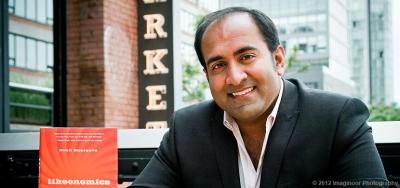You are viewing our site as an Agent, Switch Your View:
Agent | Broker Reset Filters to Default Back to List
Due to the ongoing situation with Covid-19, we are offering 3 months free on the agent monthly membership with coupon code: COVID-19A
UNLIMITED ACCESS
With an RE Technology membership you'll be able to view as many articles as you like, from any device that has a valid web browser.
Purchase AccountNOT INTERESTED?
RE Technology lets you freely read 5 pieces of content a Month. If you don't want to purchase an account then you'll be able to read new content again once next month rolls around. In the meantime feel free to continue looking around at what type of content we do publish, you'll be able sign up at any time if you later decide you want to be a member.
Browse the siteARE YOU ALREADY A MEMBER?
Sign into your accountWhy Being Liked Matters
November 11 2012
Guest contributor Meg White of REALTOR®Mag says:
 Marketing strategist and author Rohit Bhargava explains the value of likability and why personal bonds may matter more than experience.
Marketing strategist and author Rohit Bhargava explains the value of likability and why personal bonds may matter more than experience.
In your book Likeonomics (John Wiley, 2012), you point out that we make choices based on likability, not always straight-up ability. What would you say to those who find that unfair?
It is unfair. If life were fair, the person who was best on paper would always get the job. But we all know that the world doesn't work that way because people don't make decisions based on logic or as if they were robots. They make decisions based on emotions. There's a lot of new brain science that essentially shows this to be true. Sometimes we do choose the person we have the closer personal bond with, even though maybe that person doesn't have the same amount of experience as someone else.
Real estate professionals may assume strong social ties are always better than weak ones and so may work to strengthen weak ties. Is that a worthwhile endeavor?
Multiple pieces of scientific research actually show that, particularly around job hunting, weak ties are much more valuable to you because they introduce you to people you have no connection to. Also, social media has forced us to redefine what is a strong tie versus what is a weak tie. For example, if I make a decision on whether to buy a product based on a review from someone I don't know on Amazon, is that a strong tie or a weak tie, or is it a tie at all? At the end of the day, it influenced my purchase decision. It's changing the nature of virtual trust versus personal trust. The challenge is that anonymous reviews can influence people's behavior on whether to look for a place in a certain area, whether to trust a certain company or not, or how to price or make offers.









